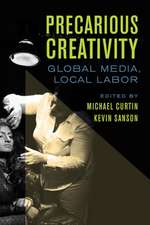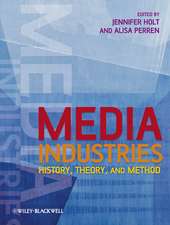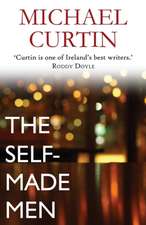The American Comic Book Industry and Hollywood: International Screen Industries
Autor Alisa Perren, Gregory Steireren Limba Engleză Paperback – 16 iun 2021
| Toate formatele și edițiile | Preț | Express |
|---|---|---|
| Paperback (1) | 161.76 lei 3-5 săpt. | +31.58 lei 4-10 zile |
| Bloomsbury Publishing – 16 iun 2021 | 161.76 lei 3-5 săpt. | +31.58 lei 4-10 zile |
| Hardback (1) | 469.31 lei 3-5 săpt. | |
| Bloomsbury Publishing – 16 iun 2021 | 469.31 lei 3-5 săpt. |
Din seria International Screen Industries
- 14%
 Preț: 179.10 lei
Preț: 179.10 lei - 28%
 Preț: 180.71 lei
Preț: 180.71 lei - 30%
 Preț: 574.51 lei
Preț: 574.51 lei - 30%
 Preț: 509.93 lei
Preț: 509.93 lei - 13%
 Preț: 168.15 lei
Preț: 168.15 lei -
 Preț: 230.61 lei
Preț: 230.61 lei -
 Preț: 222.74 lei
Preț: 222.74 lei -
 Preț: 231.06 lei
Preț: 231.06 lei -
 Preț: 233.37 lei
Preț: 233.37 lei -
 Preț: 225.06 lei
Preț: 225.06 lei -
 Preț: 225.57 lei
Preț: 225.57 lei -
 Preț: 223.67 lei
Preț: 223.67 lei -
 Preț: 197.65 lei
Preț: 197.65 lei - 12%
 Preț: 217.69 lei
Preț: 217.69 lei -
 Preț: 196.79 lei
Preț: 196.79 lei - 20%
 Preț: 197.34 lei
Preț: 197.34 lei -
 Preț: 189.14 lei
Preț: 189.14 lei
Preț: 161.76 lei
Preț vechi: 174.65 lei
-7% Nou
Puncte Express: 243
Preț estimativ în valută:
30.95€ • 32.32$ • 25.56£
30.95€ • 32.32$ • 25.56£
Carte disponibilă
Livrare economică 25 martie-08 aprilie
Livrare express 08-14 martie pentru 41.57 lei
Preluare comenzi: 021 569.72.76
Specificații
ISBN-13: 9781844579419
ISBN-10: 1844579417
Pagini: 264
Ilustrații: Up to 20 illustrations
Dimensiuni: 155 x 235 x 16 mm
Greutate: 0.45 kg
Editura: Bloomsbury Publishing
Colecția British Film Institute
Seria International Screen Industries
Locul publicării:London, United Kingdom
ISBN-10: 1844579417
Pagini: 264
Ilustrații: Up to 20 illustrations
Dimensiuni: 155 x 235 x 16 mm
Greutate: 0.45 kg
Editura: Bloomsbury Publishing
Colecția British Film Institute
Seria International Screen Industries
Locul publicării:London, United Kingdom
Caracteristici
Comic books and their film and TV adaptations are popular among students and widely studied across Film, Media, Literature and Art and Design departments, with dedicated modules and degree programmes on the rise
Notă biografică
Alisa Perren is Professor in the Department of Radio-Television-Film and Co-Director of the Center for Entertainment and Media Industries at The University of Texas at Austin. She is author of Indie, Inc.: Miramax and the Transformation of Hollywood in the 1990s (2012), co-editor of Media Industries: History, Theory, and Method (2009), and co-founder and editorial collective member of the journal Media Industries.Gregory Steirer is Associate Professor of English and Film Studies at Dickinson College. A former National Endowment for the Humanities fellow and researcher for the Carsey-Wolf Center's Media Industries Project, he has published extensively on digital media, comic books, and intellectual property law.
Cuprins
Introduction: The More Things Change.: The American Comic Book Industry and Hollywood in the Twenty-First Century1 Comics Pros Go to Hollywood: The Historical Evolution of the Comics-Hollywood Relationship2 Comic Books and the Economics of Intellectual Property Production3 Drawing Lines: The Place of Comic Book Artists and Writers in Hollywood4 Synergy in Theory and in Practice: Comic Books and the Contemporary Media Conglomerate5 Organizational (Dis-)Integration: Publisher-Hollywood Relationships in the Twenty-First Century6 From Dental Floss to Dental Tape: The Strange Case of Digital Comics DistributionAfterword: Days of Future Present: The View from 2020
Recenzii
The superhero team-up of Perren and Steirer reveals how the American comic book industry intersects with the world of film and television without losing focus on the unique business and creative culture that makes comics unique. This book is essential reading for anyone interested in how the 21st century comics business has-and has not-changed through its alliance with Hollywood. Yet students of film and television will find the book equally important as it reveals how those industries, too, might be transformed in turn by their relationship to comics. A must read for anyone interested in the amazing convergences, spectacular strategies, and uncanny mutations that define media industries.
If you are looking for an analysis about how the comic book industry works in the twenty-first century and the connection between it and Hollywood then you will be richly rewarded by Perren and Steirer's meticulous and insightful book.
What Perren and Steirer have penned is long overdue, but arguably well-worth the wait. As the comic book industry continues to be exploited by Hollywood, the questions of impact and effect on both industries have grown ever more important. To those of us for whom comics is our passion as much as our livelihood, analysis of the relationship between the two is more important than ever. This is a relationship that will never be unmade, and understanding not just the tensions binding us together, but the dangers, isn't simply wise; it may be vital to the very survival of our medium. This is a work that every comic creator should study, and that comics publisher should learn, and that every Hollywood exec should, at the least, pretend they've read.
An interesting and informative read for all those tinfoil-and-Super-8 kids in '70s and '80s who grew up watching half-heartedly made TV shows and movies about their favorite comic characters, thought they could do better, and went on not just to create comics, but also modern movies and TV inspired by them. For those interested in the secret origin of how Hollywood got super-powers, Perren and Steirer reveal all.
The book can also be used in dialogue with formal or narrative studies of contemporary superhero comics and films, or as an economic counterpoint to fan studies approaches. In any case, this is an undeniable success.
If you are looking for an analysis about how the comic book industry works in the twenty-first century and the connection between it and Hollywood then you will be richly rewarded by Perren and Steirer's meticulous and insightful book.
What Perren and Steirer have penned is long overdue, but arguably well-worth the wait. As the comic book industry continues to be exploited by Hollywood, the questions of impact and effect on both industries have grown ever more important. To those of us for whom comics is our passion as much as our livelihood, analysis of the relationship between the two is more important than ever. This is a relationship that will never be unmade, and understanding not just the tensions binding us together, but the dangers, isn't simply wise; it may be vital to the very survival of our medium. This is a work that every comic creator should study, and that comics publisher should learn, and that every Hollywood exec should, at the least, pretend they've read.
An interesting and informative read for all those tinfoil-and-Super-8 kids in '70s and '80s who grew up watching half-heartedly made TV shows and movies about their favorite comic characters, thought they could do better, and went on not just to create comics, but also modern movies and TV inspired by them. For those interested in the secret origin of how Hollywood got super-powers, Perren and Steirer reveal all.
The book can also be used in dialogue with formal or narrative studies of contemporary superhero comics and films, or as an economic counterpoint to fan studies approaches. In any case, this is an undeniable success.



















